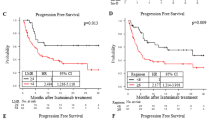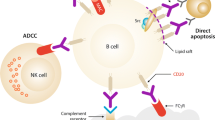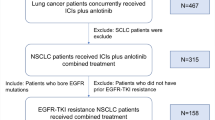Abstract
The GALLIUM study showed a progression-free survival advantage of 7% in favor of obinutuzumab vs. rituximab-based immunochemotherapies as first-line therapy in follicular lymphoma (FL) patients. Yet, the toxicity appears to be increased with obinutuzumab-based therapy. This is a multicenter retrospective-cohort study including adult FL patients comparing the toxicity of first-line rituximab vs. obinutuzumab-based chemo-immunotherapies (R and O groups, respectively). We compared the best standard-of-care therapy used per time period, before and after obinutuzumab approval. The primary outcome was any infection during induction and 6 months post-induction. Secondary outcomes included rates of febrile neutropenia, severe and fatal infections, other adverse events, and all-cause mortality. Outcomes were compared between groups. A total of 156 patients were included in the analysis, 78 patients per group. Most patients received bendamustine (59%) or CHOP (31.4%) as adjacent chemotherapy. Half of the patients received growth-factor prophylaxis. Overall, 69 patients (44.2%) experienced infections, and a total of 106 infectious episodes were recorded. Patients in the R and O groups had similar rates of any infection (44.8% and 43.5%, p = 1), severe infections (43.3% vs. 47.8%, p = 0.844), febrile neutropenia (15% vs. 19.6%, p = 0.606), and treatment discontinuation, as well as similar types of infections. No covariate was associated with infection in multivariable analysis. No statistically significant difference was evident in adverse events of grades 3–5 (76.9% vs. 82%, p = 0.427). To conclude, in this largest real-life study of first-line treated FL patients comparing R- to O-based therapy, we did not observe any difference in toxicity during the induction and 6 months post-induction period.
Similar content being viewed by others
Data availability
The data supporting this study’s findings are available from the corresponding author, TB, upon reasonable request.
References
Teras LR, DeSantis CE, Cerhan JR et al (2016) 2016 US lymphoid malignancy statistics by World Health Organization subtypes. CA Cancer J Clin 66:443–459. https://doi.org/10.3322/caac.21357
Dotan E, Aggarwal C, Smith MR (2010) Impact of rituximab (rituxan) on the treatment of B-cell non-Hodgkin’s lymphoma. P T 35:148–157
Schulz H, Bohlius JF, Trelle S et al (2007) Immunochemotherapy with rituximab and overall survival in patients with indolent or mantle cell lymphoma: a systematic review and meta-analysis. J Natl Cancer Inst 99:706–714. https://doi.org/10.1093/jnci/djk152
Marcus R, Davies A, Ando K et al (2017) Obinutuzumab for the first-line treatment of follicular lymphoma. N Engl J Med 377:1331–1344. https://doi.org/10.1056/NEJMoa1614598
Townsend W, Buske C, Cartron G et al (2020) Comparison of efficacy and safety with obinutuzumab plus chemotherapy versus rituximab plus chemotherapy in patients with previously untreated follicular lymphoma: updated results from the phase III Gallium Study. JCO 38:8023–8023. https://doi.org/10.1200/JCO.2020.38.15_suppl.8023
McNamara C, Montoto S, Eyre TA et al (2020) The investigation and management of follicular lymphoma. Br J Haematol 191:363–381. https://doi.org/10.1111/bjh.16872
Dreyling M, Ghielmini M, Rule S et al (2021) Newly diagnosed and relapsed follicular lymphoma: ESMO Clinical Practice Guidelines for diagnosis, treatment and follow-up. Ann Oncol 32:298–308. https://doi.org/10.1016/j.annonc.2020.11.008
Gafter-Gvili A, Ribakovsky E, Mizrahi N et al (2016) Infections associated with bendamustine containing regimens in hematological patients: a retrospective multi-center study. Leuk Lymphoma 57:63–69. https://doi.org/10.3109/10428194.2015.1046862
Horan TC, Andrus M, Dudeck MA (2008) CDC/NHSN surveillance definition of health care-associated infection and criteria for specific types of infections in the acute care setting. Am J Infect Control 36:309–332. https://doi.org/10.1016/j.ajic.2008.03.002
Freifeld AG, Bow EJ, Sepkowitz KA et al (2011) Clinical practice guideline for the use of antimicrobial agents in neutropenic patients with cancer: 2010 update by the Infectious Diseases Society of America. Clin Infect Dis 52:e56-93. https://doi.org/10.1093/cid/cir073
Freites-Martinez A, Santana N, Arias-Santiago S, Viera A (2021) Using the common terminology criteria for adverse events (CTCAE – version 5.0) to evaluate the severity of adverse events of anticancer therapies. Actas Dermo-Sifiliográficas (English Edition) 112:90–92. https://doi.org/10.1016/j.adengl.2019.05.021
Cheson BD, Fisher RI, Barrington SF et al (2014) Recommendations for initial evaluation, staging, and response assessment of Hodgkin and non-Hodgkin lymphoma: the Lugano classification. J Clin Oncol 32:3059–3068. https://doi.org/10.1200/JCO.2013.54.8800
Claustre G, Boulanger C, Maloisel F et al (2022) Comparative analysis of rituximab or obinutuzumab combined with CHOP in first-line treatment of follicular lymphoma. J Cancer Res Clin Oncol. https://doi.org/10.1007/s00432-022-04155-2
Amitai I, Gafter-Gvili A, Shargian-Alon L et al (2021) Obinutuzumab-related adverse events: a systematic review and meta-analysis. Hematol Oncol 39:215–221. https://doi.org/10.1002/hon.2828
Shimony S, Bar-Sever E, Berger T et al (2021) Late onset neutropenia after rituximab and obinutuzumab treatment - characteristics of a class-effect toxicity. Leuk Lymphoma 62:2921–2927. https://doi.org/10.1080/10428194.2021.1948037
Pfreundschuh M, Müller C, Zeynalova S et al (2014) Suboptimal dosing of rituximab in male and female patients with DLBCL. Blood 123:640–646. https://doi.org/10.1182/blood-2013-07-517037
Horesh N, Horowitz NA (2014) Does gender matter in non-hodgkin lymphoma? Differences in epidemiology, clinical behavior, and therapy. Rambam Maimonides Med J 5:e0038. https://doi.org/10.5041/RMMJ.10172
Cartron G, Hourcade-Potelleret F, Morschhauser F et al (2016) Rationale for optimal obinutuzumab/GA101 dosing regimen in B-cell non-Hodgkin lymphoma. Haematologica 101:226–234. https://doi.org/10.3324/haematol.2015.133421
Yıldız A, Albayrak M, Pala Ç et al (2018) Infections in patients with lymphoma: an analysis of incidence, relationship and risk factors. J Infect Dev Ctries 12:741–747. https://doi.org/10.3855/jidc.10399
Gafter-Gvili A, Gurion R, Raanani P et al (2017) Bendamustine-associated infections-systematic review and meta-analysis of randomized controlled trials. Hematol Oncol 35:424–431. https://doi.org/10.1002/hon.2350
Anaissie EJ, Kontoyiannis DP, O’Brien S et al (1998) Infections in patients with chronic lymphocytic leukemia treated with fludarabine. Ann Intern Med 129:559–566. https://doi.org/10.7326/0003-4819-129-7-199810010-00010
Hensel M, Kornacker M, Yammeni S et al (2003) Disease activity and pretreatment, rather than hypogammaglobulinaemia, are major risk factors for infectious complications in patients with chronic lymphocytic leukaemia. Br J Haematol 122:600–606. https://doi.org/10.1046/j.1365-2141.2003.04497.x
Solal-Céligny P, Roy P, Colombat P et al (2004) Follicular lymphoma international prognostic index. Blood 104:1258–1265. https://doi.org/10.1182/blood-2003-12-4434
Levy I, Lavi A, Zimran E et al (2021) COVID-19 among patients with hematological malignancies: a national Israeli retrospective analysis with special emphasis on treatment and outcome. Leuk Lymphoma 62:3384–3393. https://doi.org/10.1080/10428194.2021.1966782
Visco C, Marcheselli L, Mina R et al (2022) A prognostic model for patients with lymphoma and COVID-19: a multicentre cohort study. Blood Adv 6:327–338. https://doi.org/10.1182/bloodadvances.2021005691
García-Suárez J, de la Cruz J, Cedillo Á et al (2020) Impact of hematologic malignancy and type of cancer therapy on COVID-19 severity and mortality: lessons from a large population-based registry study. J Hematol Oncol 13:133. https://doi.org/10.1186/s13045-020-00970-7
Tvito A, Ronson A, Ghosheh R et al (2022) Anti-CD20 monoclonal antibodies inhibit seropositive response to Covid-19 vaccination in non-Hodgkin lymphoma patients within 6 months after treatment. Exp Hematol 107:20–23. https://doi.org/10.1016/j.exphem.2021.12.396
Gurion R, Rozovski U, Itchaki G et al (2022) Humoral serological response to the BNT162b2 vaccine is abrogated in lymphoma patients within the first 12 months following treatment with anti-CD2O antibodies. Haematologica 107:715–720. https://doi.org/10.3324/haematol.2021.279216
Author information
Authors and Affiliations
Contributions
TB, AGG, and RG conceived the presented idea for the study and designed the research study. TB, SA, BN, NG, NH, RH, AA, ES, and UA identified through databases follicular lymphoma patients as potential candidates for the study and collected the data. TB, AGG, RG, and TS analyzed the data. TB, AGG, and RG drafted the manuscript. TB, SS, AGG, and RG contributed to the interpretation of results and, along with AA, PR, and TS, critically revised the paper. All authors approved the submitted and final version of the manuscript.
Corresponding author
Ethics declarations
Ethics approval
All procedures performed in studies involving human participants were in accordance with the ethical standards of the institutional research committee and with the 1964 Helsinki Declaration and its later amendments or comparable ethical standards. Approval was obtained from Rabin Medical Center (RMC) Institutional Review Board (IRB) ethics committee.
Consent to participate
Informed consent was waived due to the retrospective design of the study.
Competing interests
Tamar Berger—Janseen (honoraria, advisory committee), Neopharm (advisory committee).
Boaz Nachmias—AbbVie (consultant, honoraria, research funding).
Pia Raanani—Pfizer (advisory board, consultancy, research support, speaker’s bureau); Novartis (consultancy, research support); BMS (consultancy); Janssen (speaker’s bureau).
Ronit Gurion—Roche, Gilead, Medison Ltd, Novartis, and Takeda (honoraria and advisory committee).
All other authors have no relevant financial or non-financial interests to disclose.
Additional information
Publisher's note
Springer Nature remains neutral with regard to jurisdictional claims in published maps and institutional affiliations.
Supplementary Information
Below is the link to the electronic supplementary material.
Rights and permissions
Springer Nature or its licensor (e.g. a society or other partner) holds exclusive rights to this article under a publishing agreement with the author(s) or other rightsholder(s); author self-archiving of the accepted manuscript version of this article is solely governed by the terms of such publishing agreement and applicable law.
About this article
Cite this article
Berger, T., Shochat, T., Aumann, S. et al. Rituximab versus obinutuzumab-based first-line chemoimmunotherapy for follicular lymphoma—a real-world multicenter retrospective cohort study. Ann Hematol 102, 2127–2136 (2023). https://doi.org/10.1007/s00277-023-05306-2
Received:
Accepted:
Published:
Issue Date:
DOI: https://doi.org/10.1007/s00277-023-05306-2




